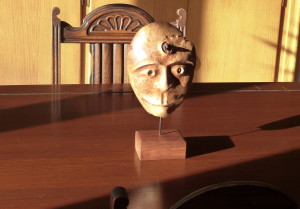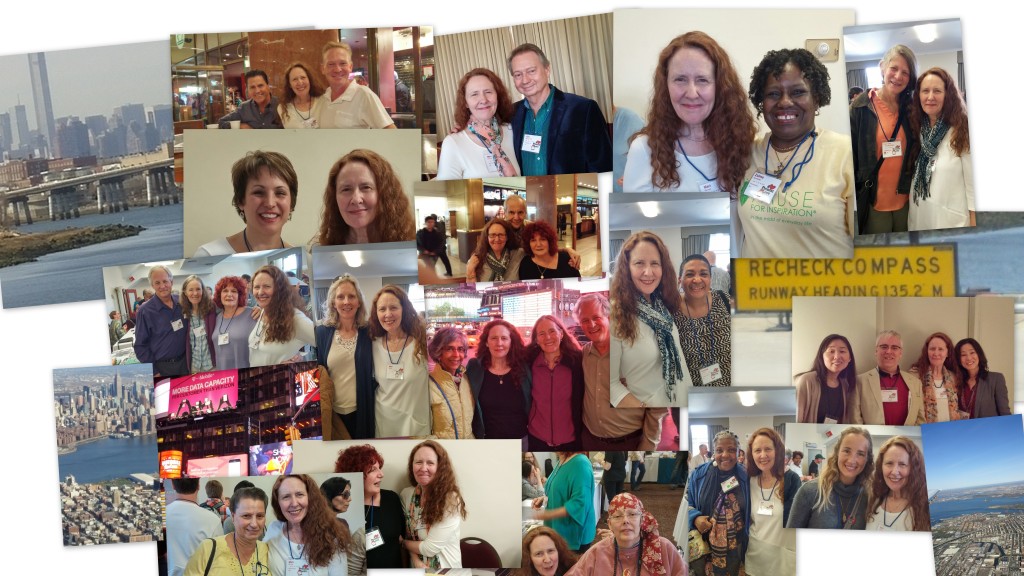Mari’s Blog
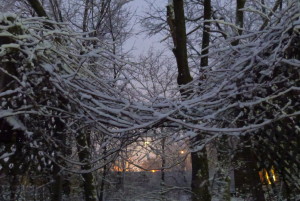
The Power of the Person
If I speak with human tongues and angelic as well, but do not have love, I am a noisy gong, a clanging cymbal. If I have the gift of prophecy and, with full knowledge, comprehend all mysteries, if I have faith great enough to move mountains, but have not love, I am nothing. Corinthians 13.1-2
Due to her age and the weather, Mom and I skipped a few weeks at church. Last night we were back. When the reading was the famous “Love is” from Corinthians, I settled in.
Unfortunately, there was a visiting priest who was still lost in a contest nature of heaven. He actually said, “Do you want your children to give only ten percent and only get ten percent of heaven?” How he got there from “Love is” I can’t tell you. What happened to, “Love never fails?” It was painful to hear and it got me pondering the power of the person. The institution matters too (for good and ill), but the individual within the institution, the individuals with a true voice, are still where the power to “be a voice” for love and change and truth lies.
Within the Catholic tradition on whose edge I stand are such titans of voice as Matthew Fox, Richard Rohr, Simone Campbell, and David Steindl-Rast. And then there are those of the near past like Henri Nouwen, and of course, countless others about whom I could go on and on. Their wisdom is often called subversive.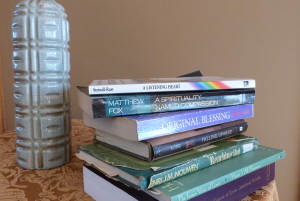
Of these I mention, only Matthew Fox was excommunicated, possibly for being the boldest and the earliest to voice his ideas of the cosmic Christ and Original Blessing, which teaches that the creation of humanity is defined not by sin but by God’s blessing of life and purpose. He is also a voice committed to Divine Feminism.
Richard Rohr, much as ACOL does, suggests Jesus’ death and resurrection is an archetypal pattern for the individual’s movement from “False Self” to “True Self,” from “who you think you are” to “who you are in God.”
Sr. Simone Campbell, (of “Nuns on the Bus”) says, “The whole contemplative life thing is about “walking willing” aware that we’re one body. . . . All of creation is one body.”
Brother David has long been a voice for love. He now sees a shift wherein the emphasis is moving from the institution to personal experience, and says, “It is happening in people’s lives on a very large scale, and it is absolutely irreversible.” To which I say, “Hurrah!”
I write of this because powerful voices were on my mind this morning, but also because I see, through ACOL, the power of the person being returned to us. That this is a somewhat controversial notion is due, in part, to long identification of the person with the ego. In some instances it seems like the ego has an imbedded position that just won’t give—not because the person claiming it isn’t loving—but because it has become, in some sense, institutionalized—part of the lexicon of certain segments of spirituality. The idea of ego seems to hold on for dear life, at times not too unlike those in the church who hold onto the idea of sin (or earning our way to heaven).
One way the ego is an impediment to full realization of our potential is an idea that suggests that “If you think you are important, your ego is at work.” That Who we are is important, may be the most crucial idea of our age. All these people I named do not think they are important in a way that comes of ego, but they sure feel their importance as part of the Oneness of creation of which the human person is a part. They know that some of their ideas are exceedingly important, and they speak particularly of ideas of who “we” are. In hearing their ideas and seeing the persons sharing them with heart and humility, I am moved and inspired. The source of the ideas is important to me, as well as the person’s spirit, the way they share, the way they express themselves and that they live their lives with a total acceptance of the truth in all faiths.
The recognition too, that it is not easy to share one’s voice, that it takes courage as well as humility, is clear to me.
That we are a community coming to voice gives me both a sense of great possibility and a feeling of deep inner peace.
Who you are now, what your desires are, and where your talents have been recognized, are as given as the goal you now desire to realize. Again I remind you that the sameness of union is not about becoming clones or one specific type of idealized holy person. Union is being fully who you are and expressing fully who you are. This is the miracle, the goal, the accomplishment that is achieved through the reign of love, the maintenance and finally the sustainability of union. D.Day5.17
I ask you to turn your attention, I ask you to be attentive, to the relationship that you feel with God. 38.4 Being full of love for one another is the beginning of extension, the end of withdrawal. It is the mutuality of our love that causes this fullness. Remember briefly here the feelings of withdrawal you have experienced when you believed you loved more or that you were loved less by a friend or lover. Remember briefly here the feelings of withdrawal you experienced when you felt loved for being something other than that which you are. Know, through your brief contemplation of these feelings that this is behind us now. Know that we can be known and loved equally for who we are. 38.5 Call me God the Father, call me God the Mother, call me Creator, or Great Spirit, Yahweh or Allah, but call me yours. For this is who I Am. 38.6 Call yourself daughter or son, sister or brother, co-creator or friend. But call yourself mine. For we belong to one another. D.Day38
The Course of Love community will have a chance to gather following the ACIM Conference, Sunday afternoon April 10. I hope that, if it is possible for you, you will consider being there and sharing your voice and, if it is not possible, that you will be there in spirit, sharing my sense of possibility and peace. Information about the conference is available on the ACOL website www.acourseoflove.com and more will be available shortly about the ACOL gathering.
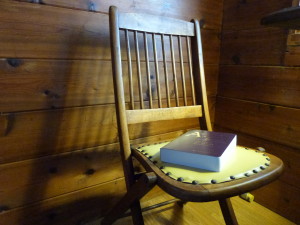
Being engaged with the experience of the heart
 The learning that occurs during the time of tenderness is learning from love. No lessons learned without love touch your heart. No lessons that do not touch your heart will accomplish anything. The purpose of the final lessons are both unlearning and moving through unlearning to new learning. These lessons must be accomplished in life and require an engagement with life. This engagement is a promise, a commitment. It requires participation, involvement, attention, being present. C:24.4
The learning that occurs during the time of tenderness is learning from love. No lessons learned without love touch your heart. No lessons that do not touch your heart will accomplish anything. The purpose of the final lessons are both unlearning and moving through unlearning to new learning. These lessons must be accomplished in life and require an engagement with life. This engagement is a promise, a commitment. It requires participation, involvement, attention, being present. C:24.4
In conversation with my friend Mary the other day, I found myself saying that what I have been drawn to explore more than anything else is my own experience. I do not yearn to look up passages of ACOL and delve into them in the same way that I care to delve into what has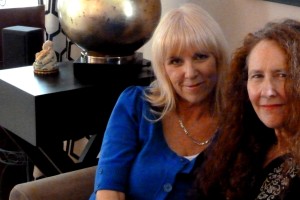 happened to me. What has occurred within me. Things I feel. Those ideas that truly capture my attention and won’t leave me alone. Those sensations that reach out and grab me and won’t let go. And so, as I talked with Mary, I saw that I was again exploring an experience. It wasn’t a conscious exploration until that moment when I realized that it was what I was doing, and then it grew to encompass all the experiences that have led me on my various explorations since the coming of ACOL.
happened to me. What has occurred within me. Things I feel. Those ideas that truly capture my attention and won’t leave me alone. Those sensations that reach out and grab me and won’t let go. And so, as I talked with Mary, I saw that I was again exploring an experience. It wasn’t a conscious exploration until that moment when I realized that it was what I was doing, and then it grew to encompass all the experiences that have led me on my various explorations since the coming of ACOL.
Some foreknowledge of this showed up a year ago in my description of the Facebook group that was then just forming. I wrote: A Course of Love’s Facebook Group is offered as a place to Explore Your Experience of A Course of Love. Each of us can do so by being true to our hearts (our Selves), expressing what we feel, and sharing what has moved us, and moved within us, from our encounter with A Course of Love (ACOL). Did I realize then the potency of the word “experience?”
At this time last year, the Facebook group had 19 members and I wrote in my journal. . . “Suddenly I . . . care.” (It now has over 400 members!) Before those first 19 members had joined, being on Facebook was not something I wanted to do. But with the joining I had some people willing to “explore their experience” along with me. Still, I had written the description and asked that my new companions share in this with me, not fully realizing what I realized the other day: that this exploration has been the source of my greatest passion and insights.
You can maybe understand the desire to explore an experience as unusual as receiving A Course of Love. It occupied much of the dozen years after its completion. I read Journey Without Distance, I read William James’ Varieties of Religious Experience, I read The Politics of Experience. I actively sought for any and all (mainly written) material that might relate. I craved affirmation of the value of “the experience,” of what happens within: before, during, and after any life-changing experiences. There were many continuing experiences that inspired this same need of exploration.
I see now that ACOL, or my encounter with Jesus, opened this experiential way of knowing that confused the heck out of me. “What” was it I had experienced? What was it saying to me? What did it say to me about the nature of the universe, of God, of myself?
I’ve just returned from a self-granted time of contemplation. Part of what I contemplated was the upcoming experience I will have at the 2016 ACIM Conference, speaking there for the first time about A Course of Love. Although I had my topic come to me many months ago in an “experiential” way . . . ha!, I wondered how I would present and fill-out this idea of speaking of “Being ALL of who we are.”
the upcoming experience I will have at the 2016 ACIM Conference, speaking there for the first time about A Course of Love. Although I had my topic come to me many months ago in an “experiential” way . . . ha!, I wondered how I would present and fill-out this idea of speaking of “Being ALL of who we are.”
And what I’ve been marvelously drawn to see during this contemplative time is the link between exploration and creativity. Rollo May, in his book, The Courage to Create, says there are pseudo forms of creativity, but that in its authentic form, creativity is “the process of bringing something new into being.” He describes true artists as “those who give birth to some new reality,” as those who “express being itself.” They “enlarge human consciousness” in the “act of actualizing themselves.”
The essential idea that he proposes is not a matter of effort, but the “degree of absorption . . . the degree of intensity . . . a specific quality of engagement.”
The word “engagement” has been speaking to me of late. It was there in my last post, and there in the last of the audio chapters I posted to the Face Book site: Chapter 24, The Time of Tenderness. This short chapter, at the end of The Course, (book 1), speaks of “final lessons” and says that “each learning experience will be a learning experience because it will touch your heart.”
Jesus’ language changes as we proceed. Soon we are no longer learning. But perhaps this is the beginning of the shift. “Each learning experience will be a learning experience because it will touch your heart.” This is the new way of knowing of A Course of Love: being engaged with the experience of the heart.
See http://www.acourseoflove.com for more info on the ACIM events (there will be an additional ACOL gathering at the end of the conference!)
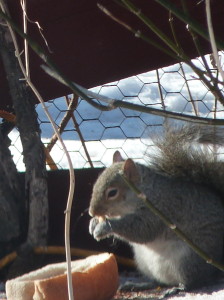
Engagement and its ebb and flow
Creation balanced with rest is the pattern that has been taken to extremes within your world. You think of birth as creation and death as rest. You do not realize that your nature, and the nature of your life, like that of all around you, is governed by seasons natural to the state of love, seasons of regeneration. T4:4.2
 I don’t think I’ve written yet about the quiet of snow. It is so lulling, a cushion to the battering ram of noise, a lessening and an expanding at ground-level, a solace willing to envelope sound and make it new. The new year has arisen and right on cue I’m feeling a new sense of engagement. I’m as psyched as the squirrel who greeted me as I approached the cabin tossing goodies of nuts and bread. I could hear his rustling anticipation before I caught sight of him scooting down a far tree. Moments after I’d closed the cabin’s door behind myself, he was dodging about like a football player, jumping here and there in a zigzag path to . . . food.
I don’t think I’ve written yet about the quiet of snow. It is so lulling, a cushion to the battering ram of noise, a lessening and an expanding at ground-level, a solace willing to envelope sound and make it new. The new year has arisen and right on cue I’m feeling a new sense of engagement. I’m as psyched as the squirrel who greeted me as I approached the cabin tossing goodies of nuts and bread. I could hear his rustling anticipation before I caught sight of him scooting down a far tree. Moments after I’d closed the cabin’s door behind myself, he was dodging about like a football player, jumping here and there in a zigzag path to . . . food.
My new sense of engagement began last week when I posted the audio of ACOL Chapter 23 to our Course of Love Facebook Group. (See A Course of Love Facebook Page) After listening to it myself, I became fascinated by the use, within the chapter, of the word “engagement,” and I noted this fascination (or it was more like it noted itself—post-it-noted itself to my consciousness). You know how that is. If you’re not feeling engaged, engagement probably isn’t going to draw you to itself. It’s part of why, in our various readings of ACOL, our shift in focus alerts us to the changes we’re feeling. So this is what happened to me and the feeling of it grew over coming days, even to seeing the word “engagement” all over the place. As I did, I felt myself veering in one moment toward passionate engagement—like okay I’m ready and excited for the ACIM Conference and “big” outward experiences, and in another toward an inner contemplation of engagement and passion’s seeming opposite. With this, I began to realize that, much like the ebb and flow of vitality that occurs with the seasons here in Minnesota, there is an ebb and flow to how Jesus speaks of engagement in ACOL.
There is a general tone toward the start that says: disengage from the life. Right away in Chapter 1, Jesus talks of our actual desire, at that time, to engage in struggle and chaos. Not doing so, he says, is something we see as an abdication. We want to prove ourselves in the world or prove our control over our world. We want to play the game even if we feel we can  never win. (C1:14)
never win. (C1:14)
It’s not until Chapter 23 that the word “engagement” arises in a different way. It is no longer “disengage from life” but now is “engage with life.” In Chapter 24 this engagement is described as moving through unlearning to new learning. “This engagement is a promise, a commitment. It requires participation, involvement, attention, being present.”
Still, as early as the first Treatise, disengagement arises again as we’re asked to turn always toward peace and away from the drama of life.
As I watch light come to the day, the sky changing from its dark indefinite hue to one of color  that blazes and then fades into the blue of day, I sense the seasons of our travels through this Course, my own stages of learning and unlearning, and the cyclical feel of them. Jesus admits to “stages of learning” only once, in A Treatise on the New…drawing that line of demarcation between what came before the Dialogues and . . . The Dialogues. Here he is assuring us of the “dawning of the consciousness of unity.” (T4:12.25)
that blazes and then fades into the blue of day, I sense the seasons of our travels through this Course, my own stages of learning and unlearning, and the cyclical feel of them. Jesus admits to “stages of learning” only once, in A Treatise on the New…drawing that line of demarcation between what came before the Dialogues and . . . The Dialogues. Here he is assuring us of the “dawning of the consciousness of unity.” (T4:12.25)
All of which I share with you to get to the culmination of this exploration, revealed in Day 27, which is aptly titled Apprehension of Levels of Experience. “You have been asked to let go of uncertainty, not certainty. You have been assured of a certainty you never before believed you were capable of. This certainty is beginning to form within you but will not come into its fullness except through experience. This certainty has only been able to begin to form within you because you have agreed to this mountain top experience while remaining engaged in life. You have thus begun to experience on two levels. This has been a goal of the time we have spent together in this way.” (D:Day 27.2)
What permission that is! What recognition! We are not only assured of, but have trained for, new experience and new levels of experience. It is our experience of life itself that will be new. No wonder engagement is called for.
The certainty we gain through “felt” experience is different than the certainty we feel from experiences of form, but not unrelated. What we feel called to is varied. Ninety percent of us will likely not climb an actual mountain, will not go on actual pilgrimages, will not leave behind the form of our current 21st century lives. Most of us will experience the dawning of the  consciousness of unity as the new reality we awaken to as we discover more and more of what is inside of us and ready to come out, and what is invisible to our ordinary senses “out there” but present to and in-forming our lives. You might say that receiving A Course of Love was a matter of experiencing on two levels. All around us, more and more people are willing to share the many and varied experiences that are happening beyond the scope of the ordinary. It may no longer sound like a peculiar anomaly to have a musician say that her song simply arrived, or that the light it came in was not the idea light bulb. As we share, our experiences cease to stand —“over there,” outside of the acceptable, happening only to the extraordinary, separated from the common person, or “other than” what we can consider to be within the nature of our being.
consciousness of unity as the new reality we awaken to as we discover more and more of what is inside of us and ready to come out, and what is invisible to our ordinary senses “out there” but present to and in-forming our lives. You might say that receiving A Course of Love was a matter of experiencing on two levels. All around us, more and more people are willing to share the many and varied experiences that are happening beyond the scope of the ordinary. It may no longer sound like a peculiar anomaly to have a musician say that her song simply arrived, or that the light it came in was not the idea light bulb. As we share, our experiences cease to stand —“over there,” outside of the acceptable, happening only to the extraordinary, separated from the common person, or “other than” what we can consider to be within the nature of our being.
Coming to know is not an aspect of the mind alone. It is not an aspect of the spirit alone. Coming to know is a quality of inner-sight, of wholehearted human experience combined with spiritual experience. You are and always have been both human and spirit, both form and content. Now you contain within you the ability to combine both levels of being through the experience of life. You have already been doing this. You are, in fact, becoming well-practiced. (D:Day27.6)
When we accept our lives as they are, and our calls to change as they arise, we live life like the little children within the ebb and flow. What ACOL calls us to is akin to my understanding of what the Buddhists call beginner’s mind. It is an openness to what is in front of us, a delight in our own experience, an awareness of it, and an appreciation for the experiences of our companions, to whom we can pose dozens of questions, letting our curiosity run wild without any notion that there might be anything in another’s experience to envy or that requires respectful distance. You and I can marvel at our own experience without any sense of bragging or being self-centered. In childlike innocence we’re just sharing and engaged with living and the discoveries that openness bring. We are not shy of new experiences. We sense before we comprehend, see vividly before we identify (if we identify at all), and find our awareness of what is beyond form and time to be both natural and miraculously wonderful.
And then, too, we might cry when the unfamiliar catches us off-guard, and be more than ready for comforting and a nap. Seasons. The current ebbing and flowing, washing our stones, clearing our pools.
What delights me about all of this is the call to change and to remain who we are, both at the same time. I’m so prone to enjoying my life as it is that I am often not thrilled at the thought of new experiences. This time has reminded me that both are possible for me and for each of us.
There are many ways that can still be found to come to the truth. But a way of getting to the truth will become so attractive that few will be able to resist. What will make this choice so attractive will not be martyrs and saintly souls stricken with every calamity and yet remaining to tell those who would listen about the glory of God. What will make this choice so attractive are ordinary people living extraordinary, and miraculous, and observable lives. T3:19.16
Again I invite you to the ACIM Conference and to the ACOL gathering that will follow it, to something new in form, and to sharing that won’t be able to help but be heightened by our togetherness, our ordinariness, and our extraordinary and miraculous and observable lives.
http://acourseoflove.com/mari-perron-in-las-vegas/
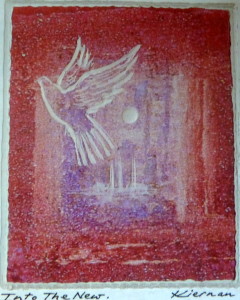
from Christmas to Conferences to . . . the New
Last week I wrote of the Christmas season’s capacity to take me out of ordinary time: “Being out of ordinary time is like visiting another state of being. Some would have us believe this only happens in meditation, or formal practices of some kind. But life is full of events that take us out of ordinary time.” A compelling aspect of this leave-taking is the return (or recovery). You return from non-ordinary time with fresh insights. My own insights have jumped forward in a surprising way—from Christmas to Conferences.
I have been a bit reticent in encouraging participation in the upcoming ACIM Conference in Las Vegas where I will be speaking for the first time. But it is as if I’ve woken up since Christmas with a new perspective, and it is due to the nature of time outside of time—due to dwelling within it in this seasonal way, and due to memories of other such times that took me out of the ordinary.
The only “major”—by which I mean “more than a hundred people” conferences I’ve ever been to were Miracles In The Mountains in 2012 and ACIM’s 2015 Conference in New York. Both took me out of ordinary time in a big way.
Yes, such conferences are big, and expensive, and busy. I would have told you last year and maybe even last month that, in general, “They are not my thing.” But in recent days, perhaps unbeknownst to me as I went about my seasonal immersion, an appreciation was arising for “all” that takes us beyond the ordinary, for “all” that lets us step out of life “as it is.” I do it every morning when I come to my cabin, and I too easily can stick with my own predilection for the quietest of “stepping outs.”
Maybe Christmas knocked me out of that with all of its activity and sounds and colors. The first thing I did when the house emptied yesterday was get rid of the red cloth and accessories on my dining room table. This table was passed down from my husband’s grandmother. It came with formidable padding and a felt-bottomed and plastic-topped under-cloth. The wood of it has never seen the light of day. Suddenly, partially due to a gift I’d received from an artist friend, I had to get down to the wood! As soon as I did, I was ready to declutter . . . everything! This is part of the return/recovery; one of the graces of coming back after time outside of time. Suddenly, you might not want your mother or grandmother’s dining room anymore. Suddenly, there is realization, like after a conference, of a change.
From my vast (ha!) experience, at two large conferences, I can say quite emphatically that they took me out of ordinary time. The words “full immersion” come to mind. Oh, I was still me. I went back to my room, as frequently as possible to catch ten minutes of quiet. I didn’t attend everything, even those things I thought I would enjoy when I packed for them. But even so, I was “in it.”
As I thought of this it reminded me of a retreat I was required to attend when I was fifteen and at the end of my sophomore year in a Catholic school. That retreat had a huge impact on my life. What happened was that all of us kids were together for a weekend, talking, under the skillful guidance of a few Franciscans, of all that we never talked about day-to-day. We cried. We laughed. Some of us kissed. For the first time, I realized that my peers had feelings similar to my own and that they were so much more than they presented themselves to be day-to-day. When I returned to school the next week and all the masks were back up, I was so brokenhearted that I vowed not to return to that school the next year. I didn’t, and the change truly altered the course of my life. But so did that glimpse behind the masks. It’s what can happen when you are “away” from the ordinary. And, at least after high school, some changes can become permanent.
The Miracles in the Mountains conference was also life-altering. It is what led to my connection with Glenn Hovemann and eventually to the republication of A Course of Love.
The ACIM Conference in New York last year opened the invitation for me to speak this year, and was an overwhelming outpouring of love that gave me confidence that the two Courses can share room in people’s minds and hearts, and that I can share myself in a new way.
When we “come back” from time outside of time, we come back different. We see newly. We change course in unexpected ways. We are . . . new.
This particular conference, for those of us of the ACOL family, is a chance to be there “at the beginning.” I know, I know, it’s fifteen years since the original publication of A Course of Love. But this conference holds historical significance. This is the beginning . . . of something . . . new. We can’t know what it will be in advance. But with certainty we can know that something will happen and that when we attend to it, and then return to our ordinary days, we will not regret that we left them. We will return . . . changed.
I’m even beginning to appreciate the idea of it being in Vegas. I see it as having nothing much to entice us to leave the haven of our hotel and each other.
I would love it if you can come. I would love to be surrounded by friends and to share this experience with you, and to remember it, years from now, as the spark that led us to . . . whatever it will be that each of us discover in our own ways.
For more information and discounted tickets, ($399 rather than $549) please see the Vegas Event page at http://acourseoflove.com/mari-perron-in-las-vegas/. Join me in heading Into the New.
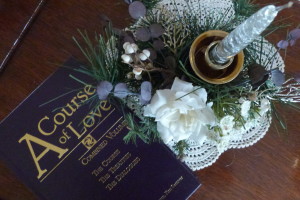
The non-dual nature of the second coming of Christ

The Christ in you is that which is capable of learning in human form what it means to be a child of God. The Christ in you is that which is capable of bridging the two worlds. This is what is meant by the second coming of Christ. C:P.7
There is only so much I can hold at this time of year, and maybe that’s the beauty of it. My oldest brother, whom I admire greatly, lives alone and says he doesn’t mind Christmas Day, but he minds Christmas season. I’ve often thought that the day will come for me when Christmas is whittled down to a holy day and the rest falls away. And yet this year I’m appreciating the way the season takes me over and takes me out of ordinary time. . . and accepting once again, in a way I come around to each year, that it includes gift giving and wrapping and baking, the occasional stress and sentimental feelings, as well as the peace of the season’s good tidings and the reprieve of simply being out of the “ordinary.” I can appreciate anything that takes me out of ordinary time. Being out of ordinary time is like visiting another state of being. Some would have us believe this only happens in meditation, or formal practices of some kind. But life is full of events that take us out of ordinary time.
In the Catholic Church, Ordinary Time is called “ordinary” because the weeks are numbered. The Latin word ordinalis, which refers to numbers in a series, stems from the Latin word ordo, from which we get the English word order. Thus, Ordinary Time is in fact the ordered life of the Church—the period in which we live our lives neither in feasting (as in the Christmas and Easter seasons) or, as in Advent, in watchfulness and expectation of the Second Coming of Christ.*
It was then, and is now, meaningful to me that in 1998, A Course of Love began as the season of Advent began. . . the season that marks the Second Coming of Christ and the end of Ordinary Time.
How often do we let ourselves take a break from our own version of numbered days, from the ordinary, from “the way things are” for us? How often do we stop working? How often do we give our most stalwart or beloved practices a rest and do something different? Let ourselves be taken up by a season? For many the answer is frequently, for some it is rarely. There are seasons of planting and harvest that gardeners get lost in, letting them take precedence over all else. There are seasons of birthing and dying that take us away into joy or grief and its attendant ritual. There are seasons of illness and fatigue and seasons of vigorous, active good health. There are seasons of creativity, of absorption in art or music. There are even seasons of publishing . . . ha! Seasons where the push is on and we’re all-consumed with fervor over one thing only. I have felt that for a while, and loved it, and yet am feeling a pull toward a season of solitude that I will also honor . . . soon.
These seasons can be allowed or denied. Each of us are so blessed by our distinctness in unity that we do not have to follow in any particular way. Yet to give ourselves over to the seasons of our lives, in moments or weeks or months that “call us away,” is something we must allow and accept if they are going to happen without inner or outer conflict.
“If you do not accept your Self, all of yourself, you cling to suffering.” (D:Day2.26)
It seems to me that each year I stand for days on the edge of this acceptance before I allow myself to fall over the cliff into this acceptance. . . and it is true for other seasons as well. Life is full of pauses and leaps.
A Course of Love calls us to the grandest leap of all, to accepting the second coming of Christ in our own lives.
In the Treatises, the second coming is called the energy that will bridge the two worlds. (T1:6.9) The bridging nature of A Course of Love is perhaps a more heartfelt and human-oriented way of expressing non-duality. We need not see our humanity as false in order to see oneness as true. Like Jesus, we too can be the coming of the Christ, the bridge that unites. What is more non-dual that this reconciling, in us and in the world, of the both/and nature of our being into an inclusive oneness of being! Heaven and Earth are joined, and our humanity and divinity are one in Christ. There is no loss but only gain!
In Day 10 of The Dialogues, Jesus tells us he’s going to be with us in a new way; that he came to us in the form of the consciousness of the man he was because we weren’t ready yet to give up our reliance on an outside source for reliance on ourselves; we weren’t ready to give up Jesus for Christ-consciousness. We have, he says, been unable to see the two as the same, and he concludes in this way:
This sameness of the person you are and Christ-consciousness, of union and presence, of the individual and the universal, is what the elevated Self of form must encompass. D:Day10.19
The non-dualism of ACOL is found in our call to be this new Self. It is found in showing us that there is no distinction between the divine and the human. There is no ultimate distinction between heaven and earth. There is only distinction between truth and illusion . . . until truth reigns in us. It is a both/and theology that calls us to accept ourselves now, and to, through acceptance in union and relationship, be true selves. When Jesus departs from us, first as teacher, and later as the man he once he was, he does so to get us to accept our own ability to live with Christ-consciousness and to embrace the second coming.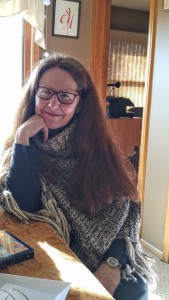
Being present as our true selves, we are available to be present to one another and for all the seasons of life and love. This is my wish for you in this holy season. With love~ Mari
*catholicism.about.com



